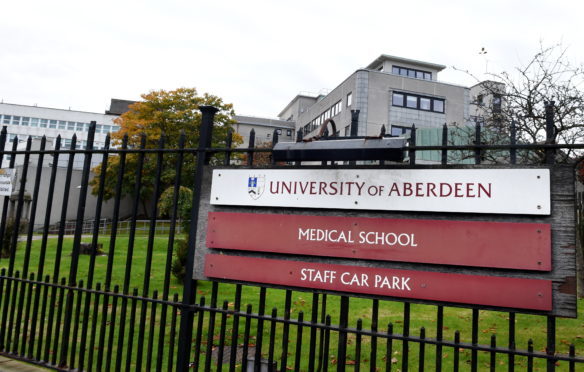More than a quarter of Aberdeen University’s campus is in need of major repair – with international students holding the key to further development.
Internal documents seen by the Press and Journal indicate that about 21% of the university’s academic estate is “operational, but major repair or replacement needed in the short to medium term” while a further 5% is “inoperable, or at serious risk of major failure.”
The court circular, taken at the end of June, states that in order to make the institution attractive to students across the world, the repairs must be carried out and that there are “significant risks to health, safetyand regulatory compliance requirements” if they are not.
University bosses will initially use loans to finance a £68million redevelopment of the King’s College campus.
And they hope that by doing so, international students will continue to choose the Granite City – as their “premium” fees will help cover the cost of potential further developments and improvements.
Non-EU students pay tuition fees of up to £18,400 a year, compared to the £9,250 paid by students from England, Wales and Northern Ireland.
The first phase of the £68million works would include around £11.5million being spent on creating new learning spaces, but the report notes other universities have already carried out major capital works.
While EU and Scottish students have their fees paid by the Scottish Government, students from the rest of the UK generally pay over £9,000 a year for their education.
However this pales compared to the between £14,600 and £18,400 that non-EU students entering the institution this year will pay.
In coming years the university, founded in 1495, forecasts the number of undergraduate learners from England, Wales and Northern Ireland will drop by 15%.
By comparison, the document’s “growth targets” suggest international undergraduate numbers will rise by 8% by 2021.
The university wants to boost the numbers doing more expensive post-graduate courses (PGT), and expects an 88% increase in international students.
The report reads: “It should be noted that the priority projects identified to deliver transformation across King’s College will look to external borrowing to enable investment, justified by investment returns projected via the university’s strategic plans for growth.
“As noted, these are largely predicated on the recruitment of students on international and premium fee paying programmes.”
Other funding options include a fundraising campaign – with “some scope for philanthrophic giving” – and access to charitable foundations, such as the Wellcome Trust, as well as the existing annual cash-flows.
Last night an Aberdeen University spokesman stressed that the 5% of “inoperable” space was not open to students or staff, while the 21% posed no danger to anyone entering and had passed health and safety checks.
He said: “The maintenance and development of our estate is critical to the achievement of our strategic goals, one of which is to create an enlivened, vibrant and diverse campus environment that will further enhance our standing as an internationally leading institution.
“As with other ancient universities, we face not insignificant challenges when it comes to keeping older parts of our infrastructure up to the high standards our staff and students deserve.
“Our recently opened £37million Rowett Institute building and planned £35million Science Teaching Hub gives an idea of the level of investment we are making in order to continue to attract the best students from around the world and we will continue to invest strategically in our campus going forward.”
